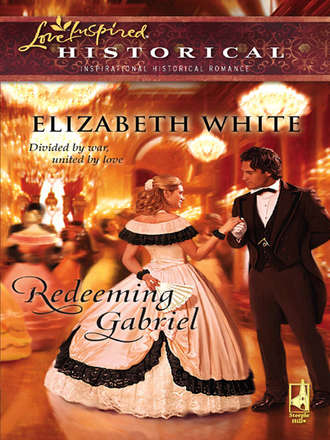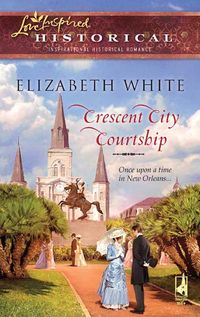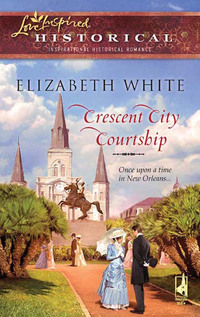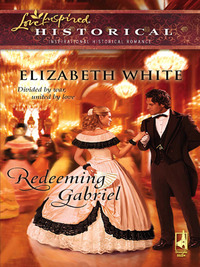
Полная версия
Redeeming Gabriel
“Me, too. God preserve him.”
Jamie wasn’t afraid of anything, especially not a Yankee clipper. He took life exactly as it came, laughing at the worst dangers, even her question about the fish boat. Was his amusement genuine—or did it serve the purpose of hiding his thoughts? Everything with Jamie was usually right on the surface. Maybe her assumption that he knew about the boat was wrong.
She paused in the kitchen doorway, absently swinging the heavy hamper. “Portia, I heard something funny last night on my way in the house.”
Portia’s head whipped around. “Shush, little girl! Mind yourself!” She jerked her head toward the back door. “Come out this way, and we’ll walk around the house.”
As they picked their way through the kitchen vegetable garden, Portia drew close, sharing the handle of the hamper. “Why didn’t you tell me last night?” she whispered.
“I forgot,” Camilla retorted. “I was busy getting scolded!”
“Hmph. And didn’t you deserve it. What’d you hear?”
“Did you know Papa had a man in his office in the middle of the night?”
Portia gave her an enigmatic look. “If he did, it isn’t any of my business.”
“They were discussing an underwater boat. Have you ever heard of such a thing?”
Portia snorted. “In the book of Jonah.”
“It could happen. And Papa’s planning to get rich off it.”
Portia smiled. “He’d have a long way to go before—”
Camilla stamped her foot. “He’s financing this—this fish boat, to sell to the government so they can blow up Yankee ships.” At Portia’s quizzical look, she began to walk again. “I know it sounds incredible. They built it in New Orleans, then sank it when the Yankees took over. Now they’re going to rebuild it right here in Mobile.”
Camilla had half expected Portia to pooh-pooh the idea, much as Jamie had. But the housekeeper’s broad, smooth brow puckered. “Men and their all-fired gadgets,” she muttered. They reached the flagged walkway in Lady’s flower garden. Portia abruptly stopped and handed Camilla the hamper. “Take this to your brother, and tell him I said happy sailin’.”
“But what should I do? You know, about the boat?”
“You ain’t a baby anymore. You heard more than’s good for you, so keep your mouth shut and your eyes and ears open. Don’t you do anything.” Portia’s fierce gaze speared Camilla. “You hear me?”
“S-so you believe me?” Portia’s belief was infinitely more frightening than Jamie’s amusement.
Portia’s shoulders lifted. “I believe you heard your papa gettin’ up to some shenanigans. We’ll see how important it is.”
Numb, Camilla watched Portia head back to the kitchen. Eyes and ears open would be no problem. Mouth shut was another story.
Chapter Three
Gabriel shoved through the swinging doors of Ingersoll’s Oyster Bar and stood in the baking afternoon heat swinging a newspaper-laden canvas bag against his leg. Sooner or later his quarry was bound to surface.
Last night he’d returned to the riverboat with Delia and, while she went to her room to bathe and change, conducted a discreet search of the hold of the boat. This canvas sack—discovered behind the barrel he’d been sitting on as he waited in the dark for his courier—might or might not be a clue to the imposter’s identity, but it was all he had.
Embarking early this morning on a search, he’d put on his overanxious-relative face and questioned the proprietor of every establishment on Water Street. Downtown Mobile abounded in oyster houses, lagerbier and wine shops, and gambling and drinking saloons. Women were plentiful in those places, but no one admitted to harboring one dressed as a man.
He was about to start over on another round of the search when a violent tugging on his coat sleeve caught his attention. He looked down.
A scrawny little man in a red knit cap danced at his feet, beady pink eyes glinting under bristling eyebrows. “N—now—” The man’s head stretched and retracted as he struggled for words. “Now—where’d you get that?”
Gabriel stared at him. “Where’d I get what?”
The little man snatched at the newspaper bag. “You got it! I give it to Missy, and you stoled it!”
Gabriel swung the bag out of reach and found himself pummeled in the stomach by surprisingly potent punches. “Hey!” Instinctively he hooked his attacker around the neck and secured the skinny arms. He looked around panting. Shoppers and vendors watched with varying degrees of curiosity and disapproval. “If I let you go,” he said through his teeth, “will you settle down and listen to me?”
“Gimme back my bag!” howled the little man.
“I’ll give you back the blasted bag. Just shut up and let me ask you some questions.”
Forced to concede to Gabriel’s superior size and strength, the little man relaxed.
Gabriel released him. “No use asking if you’re crazy,” he muttered, straightening his clothing. “What’s the matter with you?”
The malevolent red-rimmed eyes fixed on his face. “You said you’d gimme the bag.”
“I will, I will. Come on, and I’ll buy you a meal.” Gabriel led the way back into the oyster bar and ordered coffee for himself and his bizarre guest.
The man slugged down his steaming coffee in three great slurps.
Gabriel waved away a waiter offering to refill the cup. “What’s your name, old man?”
The hot drink seemed to have taken some of the starch out of the man’s ire. He leaned back against the wooden booth. “Name’s Byrd. Virgil Byrd.”
How poetic. “What makes you think this bag is yours?”
“Is mine. It’s marked.”
“Marked? How?”
“Candy took a bite out of it one day when I forgot to feed her.”
Gabriel looked at the bag. Sure enough, there was a ragged hole in the bottom about the size of a half-dollar, through which he could see the rolled newspapers. “Who’s Candy?”
“That’s my mule. Candy.”
Gabriel had seen no evidence of any such animal. “You gave the bag to the mule?”
Byrd screwed up his face. “Naw. Candy just tried to eat it. Gave the bag to Missy. And you stoled it.”
“I didn’t steal it,” Gabriel said patiently, rubbing his aching forehead. “I found it. I suppose Missy’s some other animal in your menagerie.”
“Don’t know nothin’ about no na-jer-ee.” Pride and slavish devotion lit Byrd’s rheumy eyes. “Missy’s my friend.”
Gabriel had no idea if this was going anywhere, but what did he have to lose? “Missy’s my friend, too,” he said with an encouraging smile. “Pretty little thing with a curvy figure—” Byrd nodded cautiously. “Wearing a man’s outfit, smells like lily of the valley?”
Byrd cackled. “Yes, sir, that’s her! Smells better ’n a per-fume shop!”
Gabriel leaned forward. “That’s right. We were having a most interesting conversation last night. She had to leave before I could give her something. Could you tell me where I might find her?”
“Naw. Onliest time I see her is late at night when she comes to borry my bag.”
“You work for the newspaper?”
Byrd nodded. “And the railroad, too.”
Something popped loose in Gabriel’s recent memory. Somebody caught a couple of darkies with the Birdman last night. The two guards at Confederate headquarters this morning, discussing a load of moonshine. The Birdman may be crackers…
Clues came together as he scrutinized the wizened face across the table. When Byrd longingly eyed a tray on the shoulder of a passing waiter, Gabriel waved him over. “Mr. Byrd, would you care for some oysters?”
Camilla blew a lock of hair out of her eyes and straightened her back with a creak of corsets. The heat and humidity had frizzed her hair and dampened her dress under the arms. She had set up her sewing machine in the little room off the kitchen so she could converse with Portia and still run to answer the bell if her grandmother needed her. She’d have been smarter to find a place that would catch a breeze.
She put another length of burlap under the needle and pressed the foot treadle. No telling how many sandbags it would take to construct the redoubts that General Butler had ordered to be built around the northern and western edges of the city. Nothing she did was going to end the war. But if she didn’t help in these small ways, she would be considered disloyal, maybe even Lincolnite.
She shoved her spectacles higher on her nose. She had a lot of respect for Mr. Lincoln, even if he was a Yankee. If the menfolk would talk things over and solve things without blowing each other to smithereens, the world would be a better place. Early in the war, she’d questioned Papa about his stance on secession. Why, she wanted to know, didn’t they work things out through the legislative process, like the Founding Fathers intended?
At first he’d put her off, saying the whole thing was too complicated to explain to a child. When she persisted, he put down his newspaper and glared. “Because there’s more of them than there are of us. They refuse to let us choose the way of life that’s best for us. Every man has the right to examine his conscience and free his slaves or keep them. No Yankee lawyer or mill owner or journalist can understand the economics that drives our plantation system.” Camilla must have looked as if she didn’t understand it either, because her father removed his spectacles irritably. “Camilla, what’s going to happen to all those field slaves when they’re turned loose all of a sudden? The plantations will be bankrupt, so who’s going to support the poor creatures? They’re better off where they are.”
Camilla knew little about economics, and it seemed to her any human being was better off free, but Papa’s refusal to consider a person with black skin totally human made arguing with him pointless. She’d be switched, though, if she’d let him sell his soul by building a Confederate war vessel.
She bit off a thread and threw one more bag onto the pile growing beside her chair. The obvious solution to thwarting the construction of that boat would be to wait until it was built, then somehow sink it, like they’d done in New Orleans. Maybe the waste of time and expense would make them give up. Or maybe by then the war would be over.
A thought occurred to her that she almost pushed away. Disloyal. Crazy. Dangerous.
But she couldn’t seem to shake it, no matter how furiously she ran the sewing machine and sang hymns at the top of her voice.
She was undoubtedly stirring up trouble in her own mind. God wasn’t talking to her, and she couldn’t spy on her own Papa.
But she had already done that, however unwittingly. And look what it was leading to.
Had God allowed her to overhear that conversation so she could do something about it? Get hold of the plans to that boat and pass it to the Yankees? How could she trust some Northern agent she didn’t even know? How could she be sure he’d confiscate the submarine without destroying her family in the process?
Besides, the only Yankees she knew were Harry’s family in Tennessee—and Harry himself. She had no idea where he was. No help there.
She forced herself to sit quietly and pray. I don’t know where to start. I feel like Rahab, the harlot of Jericho, must have felt, waiting for the spies to arrive. You protected her and her family, so You can do the same for me. Just show me the way. Amen.
Sighing, she opened her eyes. In her experience, God sometimes took a long time to answer prayers, and then when He got around to it, He’d do it in strange and often uncomfortable ways.
One of the kitchen bells, attached to strings running all over the house, jangled. Camilla jumped to her feet. “I’ll see what she wants, Portia!” She hurried upstairs, running from her tangled thoughts.
Since Lady liked to have access to the everyday activities of her family and servants, her sitting-room door always stood open. Camilla skidded to a stop and made a rather breathless entrance.
A striking young man rose from his seat on Lady’s pink velvet sofa. At six feet, he seemed a giant in her grandmother’s small, elegant room. His bow was correct, but the hard angles of his face and the assessing gleam in his black eyes struck her as anything but polite.
Camilla dropped a curtsy and forced her gaze to her grandmother.
Lady inclined her head toward the gentleman. “Reverend Leland, I’d like to introduce my granddaughter, Camilla, who occasionally remembers her upbringing. Camilla, this is the Reverend Gabriel Leland, late of Bogue Chitto. We’re going to make him welcome as he begins a new ministry here in Mobile.” Lady smiled and jangled the bell again. “Close your mouth, child, and sit down. Portia will bring our tea.”
Jerking the spectacles off her face and sliding them in her pocket, Camilla obeyed. This dark young man who looked like the incarnation of Lucifer himself was a minister?
With thinly glazed disappointment, Gabriel watched Mrs. St. Clair’s young granddaughter pour tea. Virgil Byrd’s information that his “Missy” lived in the big white house on the corner of Dauphin and Ann streets had given him high hopes that he’d find the mysterious woman he sought—a woman who, granted, could be anybody from daughter of the house to a kitchen maid. To his relief, early this morning he’d been admitted as a visiting minister without question.
Mrs. St. Clair, white hair piled high, dressed from head to toe in pink, had graciously invited him into a room with porcelain butterflies floating on every surface. It always delighted her, she said, to find young people so diligent in serving the Lord and their country. At his request for an introduction to the charity hospitals and soldiers’ libraries, she regretfully confessed that her health no longer permitted her to go about as she once had. She then exceeded his wildest hopes by offering to send her granddaughter to accompany him.
But instead of the clever adventuress he’d been hoping to meet, into the room had burst this little hoyden. She couldn’t be more than fourteen or fifteen years old.
Mrs. St. Clair gently tapped her spoon against the fragile rim of her cup. “Tell me about your people, Reverend Leland.”
Gabriel stuck to a story he’d developed over the course of the past few years. “My father’s family are Louisiana indigo planters. My mother is a Faulkner from East Mississippi.”
“Indeed?” Mrs. St. Clair raised finely arched brows. “Perhaps my daughter, who lives in Columbus, is acquainted with the family.”
“Possibly. We’ve not visited there in several—” A strangled squeak from the granddaughter stopped him. “Miss St. Clair?” He stifled his impatience.
She mopped at a tea stain spreading across her lap. “I’m not Miss St. Clair,” she mumbled, pink-faced.
Gabriel frowned. Southern inbreeding had evidently taken its toll on the poor creature. She didn’t even know who she was.
“Camilla, the purpose of a saucer is to prevent such spills.” Amusement and affection laced Mrs. St. Clair’s admonition. “Reverend, I should explain that Camilla’s mother was my younger daughter. She is, perhaps unfortunately, a Beaumont rather than a St. Clair.”
That was when it hit him that he knew this family. Or knew of them. Beaumont. Harry Martin’s relatives. This must be the little cousin who had tagged along behind Harry and made his life miserable.
Then the girl’s expression captured his full attention. She was staring at him, mouth ajar.
For the first time, he really looked at her. His gaze went from the small capable hands clenched over the tea stain to her face. The broad, childish brow, pointed little chin, and curly hair gave her the look of a china doll. But the big caramel-colored eyes were defiant, much too knowing for a child. She recognized him. The truth began to whisper in his ear.
But how had he mistaken this underdeveloped waif for Delia Matthews?
He recovered. “Miss Beaumont, I hope I haven’t said anything to upset you. Do you know something about the Faulkner family that I don’t?”
Pink rose to her cheeks. “It’s just that you remind me of someone I met the other day. That is, you sound like him—your voice…”
So that was it. She was a sharp one, and he’d have to watch his step. “Indeed? But that’s simply not possible, as I’ve spent the past two days pursuing a rather delicate family matter.”
Mrs. St. Clair gave him an approving smile. “Most commendable to put family duty before taking on poor dearly departed Reverend Tunstall’s congregation. Is there some way in which we may be of help?”
Gabriel reluctantly gave his attention back to the older woman. “I doubt it, though I thank you. I’ve a female cousin who’s run off to join a troupe of riverboat actors. I’ve taken it upon myself to bring her back to the bosom of her family.” Camilla Beaumont’s brow puckered a little—at his mention of the riverboat? Or was it sympathy for his worry? “Forgive me, Miss Beaumont, if I’ve offended you by mentioning my cousin’s fallen state.”
She surprised him with bubble of laughter. “Mercy, I know what goes on on a riverboat. It must be rather humiliating, though, for a man of your calling to be forced to explore the nether regions of such a vessel.” The words were given a sarcastic undertone by a shrewd curling of her lips.
He met her dancing eyes and acknowledged her hit with a slight smile.
“Camilla, watch your tongue!” said her grandmother sharply. “Reverend, I believe I can help. Deplorable as it is, the soldiers spend large amounts of time and money on the riverboats, and my charitable work extends mostly in the hospitals and soldiers’ libraries. Camilla will take you around to visit the soldiers there, and you may easily make inquiries as to your cousin’s whereabouts.”
Camilla drew back, frowning. “Lady, you know I’ve got to finish the sandbags before the week is out. You could provide Reverend Leland with a letter of introduction—he’ll easily find his way around!”
“That hardly sounds neighborly,” said Mrs. St. Clair. “I’d go myself, but these old legs aren’t as spry as they used to be. The sandbags can wait.”
“But, Lady—”
“Miss Beaumont,” Gabriel interrupted smoothly, “I’d be honored if you’d consent to accompany me. Your charming presence could only promote my standing in the city.”
Camilla responded with a skeptical glare.
Mrs. St. Clair shook an arthritic finger. “And you’ll go with good grace, my girl, first thing next week.”
“All right.” Camilla jerked at the lace on her cuffs. “I’ll do it, but I don’t have to like it.”
Chapter Four
Squeezed between her grandmother and her fourteen-year-old brother Schuyler in the family pew the next morning in church, Camilla watched Reverend Leland walk past, affecting a limp and leaning romantically on a Morocco cane. He stood in the aisle looking for a place to sit, until Lady called his name and invited him to sit with them.
He shook hands with Schuyler and her father, his smile grateful and a bit bashful. Oh, he knew how to charm them all.
She’d known somehow that he would be here today. His presence was entwined with God’s answer to her prayer, this stranger with the beautiful face and whiskey-smooth voice. It made her afraid and angry and all mixed up, sitting here beside him in church, even with Lady seated between them.
He was all kindness and sincerity on the outside, and Lady seemed to think he was God’s gift to the Christian community of Mobile. But he’d all but admitted he’d been on that boat, holding her close. And now he’d come after her.
Halfway through the service, she sneaked a glance at him. He was listening to Brother Lewis’s dull-as-ditchwater sermon with rapt attention. His dark hair was slicked back, the hard angles of his face piously composed, his shirt collar white and starched.
What was she supposed to do when he tried to get her alone? Yesterday he looked like he wanted to eat her for lunch…
As if he felt her gaze, Reverend Leland suddenly looked at her. The expression in his black eyes was warm, but she still felt chilled somehow.
God protect me from this man.
He smiled and returned his attention to the minister.
After the closing hymn, Camilla stepped away from him, but Lady snagged her elbow before she could slip out of the pew.
“Reverend Leland, I hope you’ll join us for dinner. Portia’s pork roast and mashed potatoes are famous all over the county.”
“I’d be delighted!” The reverend’s white smile was made more engaging by one tooth turned slightly crooked.
Determinedly unengaged, Camilla pulled at her arm.
Lady squeezed it harder. “Camilla will keep you company on the way.”
“I appreciate your hospitality.” The reverend’s eyes sparkled. “But I’m afraid I rode to church today. My horse might object to an extra passenger.” When Lady cackled, he smiled at Camilla. “However, I will claim a carriage ride at some time in the near future.”
“She will look forward to that with great pleasure.” Lady shooed Camilla toward the door. “We’ll go on ahead and see you as soon as you can get there.”
Sunday dinner in the Beaumont household was a prolonged affair, involving much conversation and laughter. Camilla watched Reverend Leland, seated across from her, flirt gently with her grandmother, filling Jamie’s absence with an agreeable mix of self-deprecation, humor and thoughtfulness. She had to admit he was fascinating in the way of a beautiful and dangerous animal.
Without compromising her own secrets, it was going to be difficult to prove Reverend Leland wasn’t what he purported to be. But there had to be some way.
She cleared her throat and braced herself for the impact of his eyes. “Reverend, please forgive my curiosity, but I noticed you carry a cane. Have you perhaps sustained a war wound?”
“Camilla!” Lady frowned. “That is a very personal—”
“It’s quite all right, Mrs. St. Clair. I don’t mind admitting to an injury gained in honorable service of my country.” The reverend smiled, a bit of a challenge in the dark eyes.
“Indeed?” Camilla said sweetly. “Perhaps you might entertain us with a description of your exploits on the battlefield.”
He shook his head diffidently and rather sadly. “I don’t think you’d find our humiliation at Shiloh appropriate dinner-table conversation. I was one of the few to escape with my life.”
A flat and embarrassed silence fell.
Camilla’s father glared at her. “Perhaps, Reverend Leland, you’d join me on the courtyard for an after-dinner cigar?”
“Certainly, sir.” Reverend Leland, leaning heroically on his cane, accompanied her father out of the room, Schuyler following on their heels.
Lady rapped a spoon against the table. “I would like to know, young lady, what brought on this disagreeable attitude toward the first presentable young man to cross our paths since the war started.”
“Lady, doesn’t it strike you as odd that a handsome and healthy young man would spend his life riding around the country preaching?”
“It rather strikes me as commendable.” Lady wagged the spoon. “He has paid his dues in military service and now spends his time serving God. Is there some unwritten law that ministers must be short, fat and bald?”
Camilla shrugged. She refused to swallow that ridiculous story about a runaway cousin. And if he was wounded, she was Tatiana, the Queen of the Fairies.
Gabriel sprawled in a wicker chair, watching his host puff with great satisfaction on a fine Cuban cigar. Though his original strategy had been to maneuver Camilla Beaumont into a tête-à-tête, he was satisfied to spend the afternoon with a man of Ezekiel Beaumont’s standing in the transportation industry.
“Terrible losses at Shiloh,” Beaumont was saying. “You were lucky to escape with your life.”
“Yes, sir, God was on my side.” Gabriel smiled as Schuyler chose a cigar from the humidor and the elder Beaumont tweaked it out of his hand.
The boy reddened. “Do you plan on going back into service, sir?”
“I’d like to, but don’t know if they’ll have me anytime soon.” Gabriel rubbed his upper right thigh.







